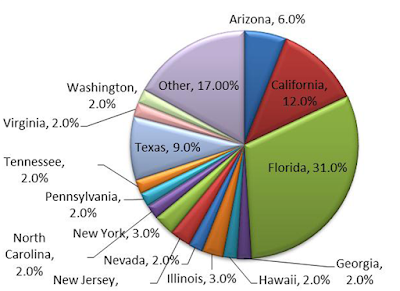The international market for U.S. residential property approaches $82 Billion on an annual basis, split equally between non-resident foreigners and recent immigrants.
There is rising affluence throughout the world, and clients come from a wide variety of countries to purchase U.S. real estate. Four states—Arizona, California, Florida, and Texas accounted for 58 percent of total U.S. residential home sales to non-resident foreigners in the 2009/2010 time frame. Florida accounted for 31 percent of total U.S. residential home sales to non-resident foreigners in the same time period. 31 percent of $82B is approximately $25.4B.
Although home buyers come from all over the world to Florida, a few countries and regions accounted for the majority of sales to international clients. Canada accounted for 39 percent of buyers, up from 36 percent in 2010. The United Kingdom accounted for 7 percent of buyers, down from 15% last year. Other countries with large numbers of buyers included Brazil (8 percent, up from 3 percent), Venezuela (7 percent, up from 3 percent) and Germany (5 percent, same as last year).
The demand for U.S. homes by foreigners is different from the overall U.S. market. All real estate is local, and the important domestic market drivers-- jobs, consumer confidence, family formation, and economic growth—have had major negative impacts on existing home sales in domestic transactions. International sales of U.S. homes to foreigners, however, have different market drivers—perceptions of value relative to foreign comps, the desire to diversify assets, potential vacation use, rental opportunities, and an interest in placing assets in areas with well-defined and secure property rights.
The location choices of foreign buyers differed markedly from the patterns reported among all home buyers nationally. Compared to all home sales, as reported in NAR’s 2010 Profile of Home Buyers and Sellers, foreign buyers were much more likely to purchase in a resort area (32 percent of foreign purchases vs. one percent of all homes sold nationwide) on in a central city/urban area (36 percent of purchases vs. 18 percent). The significant share of resort buyers is not surprising given the nature of the Florida market. In addition, international buyers found Florida’s central cities to be desirable locations in a number of instances.
South Florida, and Miami in particular, enjoys the unique quality of international recognition as a top vacation / resort destination, a center of multicultural diversity, and a critical hub for global trade and finance. It is no wonder that foreign nationals are being drawn in dramatically increasing numbers to take advantage of real estate opportunities and stake a claim in the American Riviera.In addition, businesses from all over the world recognize the benefits and strategic advantages of establishing a formal presence in Miami. The Beacon Council of Miami cites the following top 10 reasons answering the question: "Why Miami?":
Top 10 Reasons
More than 100 international consulates, trade offices, and bi-national chambers of commerce that support the worldwide flow of goods and services.
- Convenient direct air service from Miami International Airport to all major destinations in Latin America and the Caribbean – more flights to the region than any other U.S. airport.
- Ability to ship goods efficiently anywhere in the world through the Port of Miami, Florida’s largest container port.
- A central location in the Western Hemisphere and in the Eastern time zone, facilitating communications with Europe and the western United States.
- Excellent business climate with no local or state personal income tax.
- Skilled multilingual, multicultural workforce drawn from more than 100 nations.
- Strong, growing domestic economy serving more than 5.5 million South Floridians.
- Ready access to sophisticated international banking, insurance and legal services, and other professional services.
- High quality of life with a wide range of housing options, year-round outdoor recreational activities, renowned cultural institutions and four major professional sports franchises.
- Financial and workforce training incentives available to qualified companies.









No comments:
Post a Comment